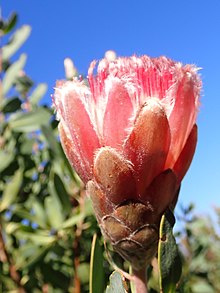Protea lacticolor
| Protea lacticolor | |
|---|---|

| |
| Scientific classification | |
| Kingdom: | Plantae |
| Clade: | Tracheophytes |
| Clade: | Angiosperms |
| Clade: | Eudicots |
| Order: | Proteales |
| Family: | Proteaceae |
| Genus: | Protea |
| Species: | P. lacticolor
|
| Binomial name | |
| Protea lacticolor Salisb.
| |
Protea lacticolor or the Hottentot sugarbush, Hottentot white sugarbush or Hottentot's Holland sugarbush,[2] [3] is a flowering shrub of the Protea genus. It is also known as the Hottentotwitsukkerbos. The plant is endemic to South Africa and is found from the Slanghoek to the Hottentots Holland Mountains and also the Groenlandberg.
The shrub is large, erect and grows up to 6 m high and blooms mainly from March to April. The plant dies after a fire but the seeds survive. The seeds are stored in a cap and released after they are ripe and spread by the wind. The plant is unisexual. Pollination occurs through the action of birds. The plant grows on the banks of streams or wet Sederberg shale at altitudes of 600 - 1,500 m. The plant's national tree number is 90.[4][5]
References
[edit]- ^ Rebelo, A.G.; Mtshali, H.; von Staden, L. (2020). "Protea lacticolor". IUCN Red List of Threatened Species. 2020: e.T113210177A185576692. doi:10.2305/IUCN.UK.2020-3.RLTS.T113210177A185576692.en. Retrieved 18 November 2021.
- ^ "White Water Sugarbushes". www.proteaatlas.org.za.
- ^ "Protea lacticolor | PlantZAfrica". pza.sanbi.org.
- ^ "Threatened Species Programme | SANBI Red List of South African Plants". redlist.sanbi.org.
- ^ "Protea (sugarbushes)". biodiversityexplorer.info.

